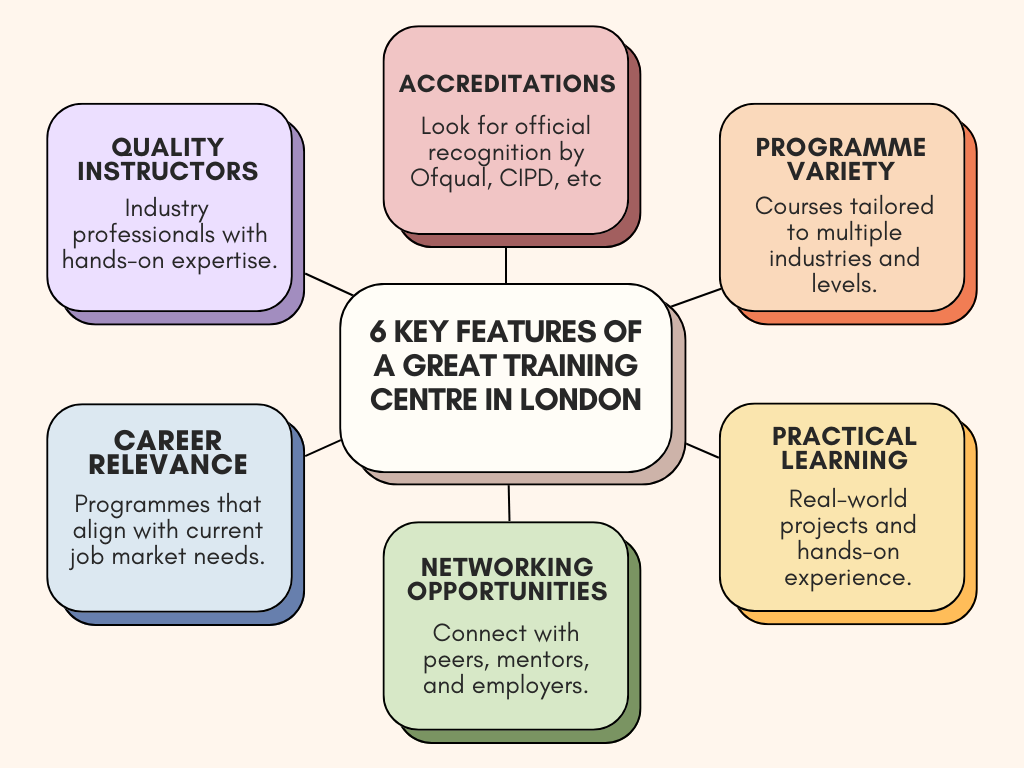- Table of Contents
- Introduction
- What to Look for in a Great Training Centre
- Accreditations:
- Diverse Programmes and Specialisations:
- Quality of Instructors:
- Networking Opportunities:
- Hands-On Learning and Real-World Projects
- Top-Rated Training Centres in London
- a. Business & Leadership
- b. Technology & Digital Skills
- c. Creative & Media Fields
- d. Health & Social Care Training
- How to Choose the Right Training for Your Career Stage
- For Recent Graduates
- For Career Changers
- For Advancing Professionals
- Top Career Advice from London-Based Experts
- Soft Skills Matter More Than Ever
- Use Training as a Launchpad for Job Opportunities
- Master the Art of Networking
- Tailor Your CV and Interview Approach to London’s Market
- Stay Curious and Committed to Lifelong Learning
- Funding & Support for Training in London
- Government Grants and Adult Education Budget
- Support for Refugees and Immigrants
- Employer-Sponsored Training and Instalment Plans
- Future Trends: Where Training in London Is Headed
- Artificial Intelligence and the Digital Transformation of Learning
- Hybrid Learning and the Rise of Flexible Schedules
- Training for a Greener, More Sustainable Economy
- Lifelong Learning and Micro-Credentials
- Human-Centric and Inclusive Learning Design
- Global Relevance with Local Impact
- Conclusion
Introduction
As one of the world’s most influential cities, London has long been recognised as a global powerhouse for business, creativity, and innovation. With its rich blend of multiculturalism and economic dynamism, London offers a unique ecosystem for professional growth and lifelong learning. The city's diverse economy spans finance, healthcare, media, technology, and the arts, making it a fertile ground for talent development and upskilling.
London's competitive job market requires professionals to stay agile, adaptable, and continuously evolving. Training is not merely a bonus but a necessity for individuals seeking to stand out. Whether you're just starting your career or navigating a mid-life career change, the city provides an abundance of high-quality training centres to support your journey.
In this article, we will explore what makes a training centre truly exceptional, highlight some of the top-rated institutions across various industries, offer tailored career advice for different stages, and examine emerging trends shaping the future of professional development in London.
What to Look for in a Great Training Centre
Accreditations:
A reputable training centre should hold recognised accreditations from national or international awarding bodies. Accreditations ensure that the curriculum meets high educational standards and that the qualifications awarded are respected by employers. Look for affiliations with organisations such as Ofqual, CIPD, PMI, or City & Guilds. These endorsements reflect credibility, rigour, and compliance with professional benchmarks.
Diverse Programmes and Specialisations:
The best centres offer a variety of programmes tailored to multiple career paths and skill levels. Whether you're interested in executive leadership, coding bootcamps, or creative arts, a strong institution will provide targeted, sector-specific training. This diversity allows learners to select courses aligned with their goals and interests, promoting both immediate career gains and long-term advancement.
Quality of Instructors:
Highly qualified trainers with real-world experience make a significant difference in the learning process. Seek out institutions that employ industry professionals, not just academic lecturers. Trainers who have worked in your desired field bring practical insights, current trends, and case-based teaching that enrich the training experience.
Networking Opportunities:
One of London’s strongest assets is its professional network. Great training centres facilitate opportunities for learners to connect with peers, mentors, industry leaders, and potential employers. Events, webinars, alumni meetups, and LinkedIn groups can expand your career circle and open unexpected doors.
Hands-On Learning and Real-World Projects
Effective training must go beyond theory. Practical experience through simulations, real-world projects, and case studies allows learners to apply their knowledge and gain confidence. Centres that partner with businesses to offer internships or client-facing projects tend to deliver better employment outcomes.

Top-Rated Training Centres in London
a. Business & Leadership
London Business School Executive Education
As one of the top business schools in the world, LBS offers world-class executive education programmes. Designed for senior professionals, their short courses cover strategy, finance, innovation, and leadership development. With a strong emphasis on global case studies and peer learning, LBS combines academic rigour with practical application.
Holistique Training
Holistique Training is a UK-based provider specialising in strategic management, HR, and leadership programmes. Renowned for its evidence-based methodologies and customised learning paths, Holistique empowers professionals across sectors to solve real organisational challenges. With clients including NHS, L'Oréal, and FedEx, it’s a trusted name in capacity building.
General Assembly London
Focused on in-demand skills like digital marketing, data analytics, UX design, and business development, General Assembly offers immersive bootcamps and part-time courses. With career coaching and a strong employer network, it bridges the gap between education and employment.
b. Technology & Digital Skills
Le Wagon London
This coding bootcamp is ideal for aspiring developers and entrepreneurs. Le Wagon offers intensive full-stack web development and data science programmes that turn beginners into job-ready professionals in under 10 weeks. The hands-on approach, vibrant community, and start-up mindset make it a favourite among tech learners.
BrainStation
Located in the heart of London, BrainStation focuses on cutting-edge digital skills. Courses in data science, software engineering, and product management are delivered by tech industry experts. The hybrid learning format and project-based teaching help students build robust portfolios.
Makers Academy
As one of the UK’s first coding bootcamps, Makers has a strong reputation for software engineering training. Their focus on emotional intelligence and inclusive teaching distinguishes them in the tech education landscape. They also have strong hiring links with companies like Deloitte and BBC.
c. Creative & Media Fields
City Lit
City Lit is a long-standing institution offering part-time and evening classes in arts, design, writing, and performance. Known for its inclusive ethos and community feel, it caters to adults of all backgrounds looking to explore or advance their creative potential.
London Film Academy
With practical, career-focused training, LFA offers intensive programmes in directing, cinematography, screenwriting, and editing. Taught by working professionals, the courses equip students for real-world production environments and foster collaboration in small cohorts.
University of the Arts London (Short Courses)
UAL offers short, accredited courses across its six colleges, covering fashion, graphic design, fine art, and communication. These courses are popular with international students and professionals seeking to refresh or expand their creative portfolios.
d. Health & Social Care Training
St John Ambulance
Renowned for first aid training, St John Ambulance also offers specialised courses in health and safety, mental health awareness, and care sector compliance. Their qualifications are widely recognised and essential for frontline health workers.
FutureLearn (with NHS partnerships)
As a digital learning platform, FutureLearn provides free and paid courses co-designed with institutions like King's College London and the NHS. Topics range from clinical care to public health policy, making it an accessible option for healthcare professionals.
Royal College of Nursing
The RCN runs CPD programmes, webinars, and leadership training tailored to nursing professionals. With strong ties to the NHS and regulatory bodies, their offerings are grounded in the latest research and policy developments.
How to Choose the Right Training for Your Career Stage
For Recent Graduates
Graduates should seek out foundational skills that are immediately applicable to entry-level roles. Short courses in project management, digital marketing, or Excel analytics can offer a competitive edge. Internships or training that offers a certificate of completion are particularly valuable.
For Career Changers
Mid-career professionals transitioning to a new field should look for immersive, skills-based programmes that offer mentorship and hands-on experience. Bootcamps, apprenticeships, and career coaching are highly beneficial for this group.
For Advancing Professionals
Those aiming for leadership roles should invest in executive education, advanced certifications, and strategic thinking programmes. Institutions like LBS or Holistique Training are ideal, offering courses tailored to managerial growth and transformation.
Top Career Advice from London-Based Experts
Soft Skills Matter More Than Ever
In a diverse and fast-paced city like London, soft skills such as communication, teamwork, adaptability, and emotional intelligence are highly valued. Many employers rank these as equally important—if not more so—than technical know-how. Training centres now incorporate modules on these skills to ensure holistic professional development.
Here’s a breakdown of key soft skills that London-based employers look for:
Soft Skill | Why It Matters in London’s Job Market |
Communication | Clear, concise communication is essential in a multicultural city with diverse clients and colleagues. |
Teamwork | Many London-based projects involve cross-functional, multi-national teams. Collaborating well is crucial. |
Adaptability | London’s industries are fast-changing. Being open to new tools, roles, or challenges is a major asset. |
Emotional Intelligence | Understanding others' emotions helps in managing teams, handling clients, and reducing conflict. |
Problem-Solving | Employers value individuals who can think critically and propose solutions under pressure. |
Time Management | With London’s high-paced work environments, meeting deadlines and prioritising tasks is vital. |
Networking | Success in London often hinges on who you know as much as what you know. Relationship-building is key. |
These skills aren’t innate—they can be developed through active practice and intentional training. Many of London’s top training centres now include soft skill development alongside technical content to ensure well-rounded career readiness.
Use Training as a Launchpad for Job Opportunities
Completing a training programme can significantly increase your visibility in the job market. Be sure to list completed courses and acquired skills on your CV and LinkedIn profile. Showcase practical projects or assignments in your portfolio, and don’t hesitate to mention certificates in interviews.
Master the Art of Networking
London's vast professional scene offers countless networking opportunities. Join alumni groups, attend industry events, and engage in online forums related to your training centre. Proactive networking can lead to job leads, mentorship, and collaborative projects.
Tailor Your CV and Interview Approach to London’s Market
Recruiters in London value clarity, achievement-based bullet points, and industry-specific terminology. Keep your CV concise, and tailor it to each role. In interviews, highlight not only what you know but how you solve problems and contribute to team goals. Practising mock interviews with a local career coach can sharpen your delivery and boost confidence.
Stay Curious and Committed to Lifelong Learning
Continuous improvement is key. London employers appreciate candidates who take the initiative to stay updated. Whether it’s a micro-credential, webinar, or short course, show that you’re investing in yourself.
Funding & Support for Training in London
Government Grants and Adult Education Budget
The Adult Education Budget (AEB) provides free or subsidised training for adults aged 19 and over, particularly those without a Level 3 qualification. Eligible individuals can access a range of courses in digital skills, health and social care, and business administration.
Support for Refugees and Immigrants
Several London-based NGOs and institutions offer targeted support for marginalised groups. Programmes like "Refugee Education UK" or "Breaking Barriers" provide language training, skills development, and career guidance tailored to immigrants and asylum seekers.
Employer-Sponsored Training and Instalment Plans
Many companies offer training allowances or sponsorships as part of employee development plans. If you're currently employed, ask your HR department about learning and development budgets. Training centres also often offer instalment payment options or financial aid for eligible learners.
Future Trends: Where Training in London Is Headed
As the professional landscape continues to evolve, training in London is adapting rapidly to meet the demands of a knowledge-based, tech-savvy, and sustainability-conscious workforce. With shifts in technology, work culture, and global priorities, London’s training providers are not just responding to change—they are actively shaping it. Below are the key trends that will define the future of professional development in the city.
Artificial Intelligence and the Digital Transformation of Learning
Artificial Intelligence (AI) is no longer a futuristic concept—it is a current and central force in transforming how education and training are delivered. In London, a city that thrives on innovation, training institutions are rapidly incorporating AI-driven solutions to enhance the learning experience.
Adaptive learning platforms now assess a learner’s performance in real-time and tailor content to their strengths, weaknesses, and pace. These platforms use machine learning to recommend resources, adjust lesson complexity, and even predict learning outcomes. AI tutors and chatbots are also becoming integral, offering 24/7 support, instant feedback, and interactive simulations.
Moreover, predictive analytics is helping training centres understand learner behaviours and identify who may need additional support—allowing for early interventions and improved outcomes. Institutions like General Assembly and BrainStation are already leveraging these technologies, making digital transformation a standard rather than a novelty.
Hybrid Learning and the Rise of Flexible Schedules
The pandemic may have introduced hybrid learning out of necessity, but it has since evolved into a preferred format for many professionals. In London—a city where time is a premium and commutes can be long—flexible schedules are no longer optional; they’re expected.
Modern learners seek autonomy over how and when they learn. Hybrid models, which blend live classroom sessions with self-paced online modules, allow learners to structure their education around work, caregiving, or personal development. Training providers are now investing in high-quality virtual classrooms, digital collaboration tools, and cloud-based learning environments to support this shift.
Beyond convenience, hybrid learning has democratised access to education. Individuals who may have once been excluded—due to geography, disability, or financial constraints—can now participate more fully in London’s training ecosystem. Providers like FutureLearn, with its strong online presence and partnerships with universities, exemplify this inclusive model.
Training for a Greener, More Sustainable Economy
As the UK continues to push towards its 2050 net-zero target, the role of training in supporting the green transition has become pivotal. London, as a global financial and innovation capital, is leading the charge by embedding sustainability across industries—from construction and transport to fashion and finance.
Training centres are responding with an increasing number of courses focused on environmental, social and governance (ESG) criteria, climate literacy, sustainable business models, and circular economy practices. These are not limited to environmentalists or scientists—professionals in marketing, finance, HR, and law are now expected to understand sustainability frameworks.
Courses in sustainable procurement, carbon accounting, and green tech innovation are growing in demand. Institutions are partnering with environmental NGOs, local councils, and private companies to create content that is practical, forward-looking, and aligned with real policy frameworks such as the UK Green Finance Strategy.
This focus is not only driven by government regulations but also by the growing demand from employers who prioritise sustainability-conscious professionals. Green skills are fast becoming core skills.
Lifelong Learning and Micro-Credentials
In a rapidly changing job market, the concept of a "one-time degree" is becoming obsolete. London is embracing the culture of lifelong learning, with professionals continually upgrading their skills through short, targeted courses.
Micro-credentials—bite-sized certifications that focus on specific skills or knowledge areas—are gaining traction. They are stackable, industry-recognised, and often more affordable than traditional qualifications. These credentials are ideal for demonstrating competency in areas such as cybersecurity, diversity and inclusion, digital literacy, or agile project management.
London-based employers increasingly recognise micro-credentials, particularly when they are endorsed by reputable providers or developed in collaboration with industry leaders. Platforms like Coursera, LinkedIn Learning, and accredited providers like Holistique Training are at the forefront of offering these agile, career-enhancing credentials.
Human-Centric and Inclusive Learning Design
Another forward-looking trend in London’s training sector is the growing emphasis on learner-centred design and inclusivity. Training is moving away from generic, one-size-fits-all formats toward more personalised, accessible, and neurodiversity-aware approaches.
Courses are now designed to accommodate different learning styles—visual, auditory, kinesthetic—and to be inclusive of learners with disabilities. Closed captions, screen reader compatibility, and content available in multiple formats are becoming standard practice.
Additionally, inclusive pedagogy now involves representing diverse voices and perspectives in case studies, readings, and group activities. This aligns with London’s broader cultural values and enriches the learning experience for all.
Global Relevance with Local Impact
Lastly, London’s training centres are increasingly bridging the gap between global standards and local realities. While many courses are internationally benchmarked, they also integrate local legislation, UK-specific frameworks, and regionally relevant case studies. This dual approach ensures that learners are prepared to operate effectively both within and beyond the UK context.
For example, leadership training may include modules on UK employment law and mental health in the workplace, alongside global theories of transformational leadership. Similarly, project management courses might embed both international PMP standards and local procurement regulations.
Conclusion
London offers a wealth of resources, institutions, and opportunities for anyone serious about professional development. From globally respected training centres to niche providers focused on emerging skills, the city caters to learners at every stage of their journey.
Choosing the right training programme can be a transformative decision. It can lead not only to better job prospects but also to personal growth, expanded networks, and increased confidence. London’s dynamic environment ensures that the learning never stops—and neither should you.
Ready to elevate your career in London? Subscribe to our newsletter for expert insights, course recommendations, and career tips tailored to ambitious professionals like you.
























